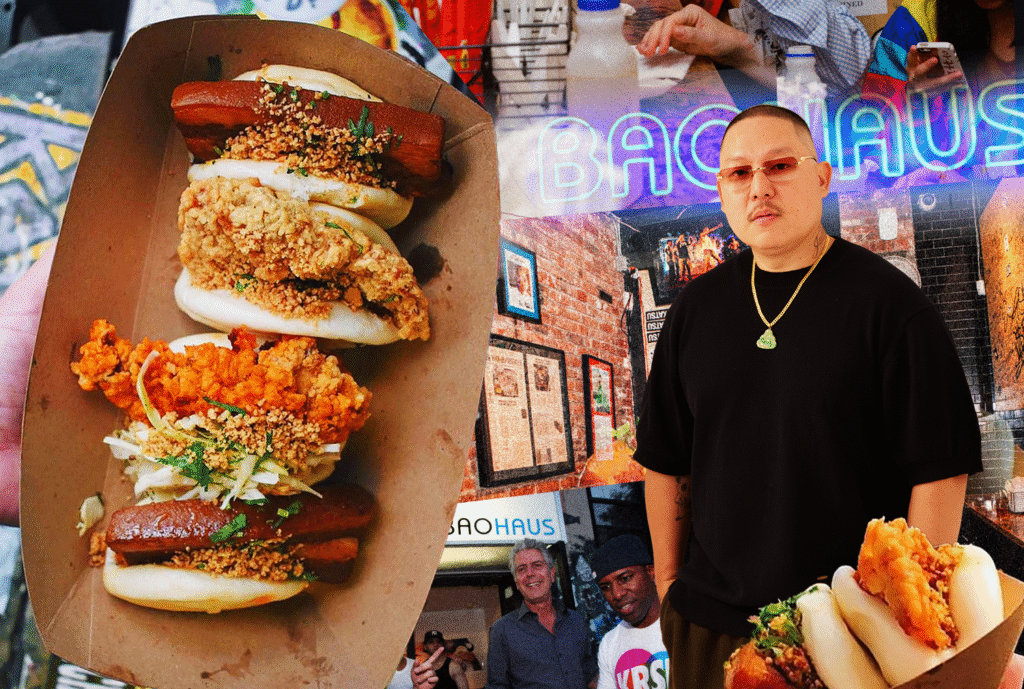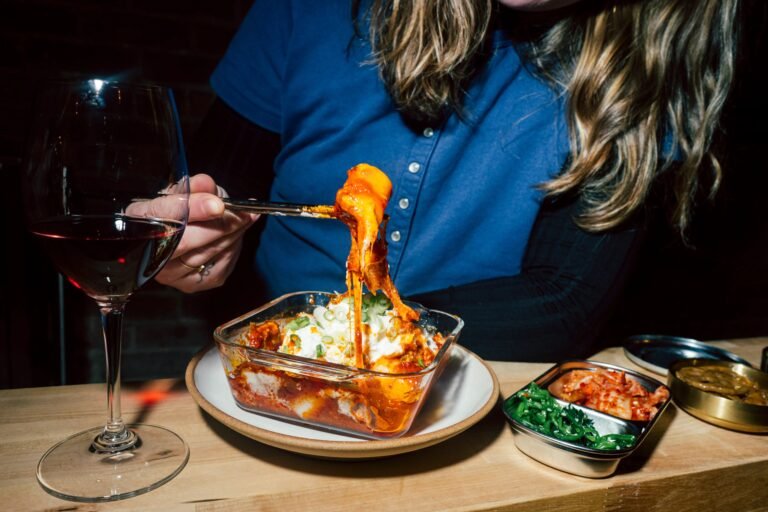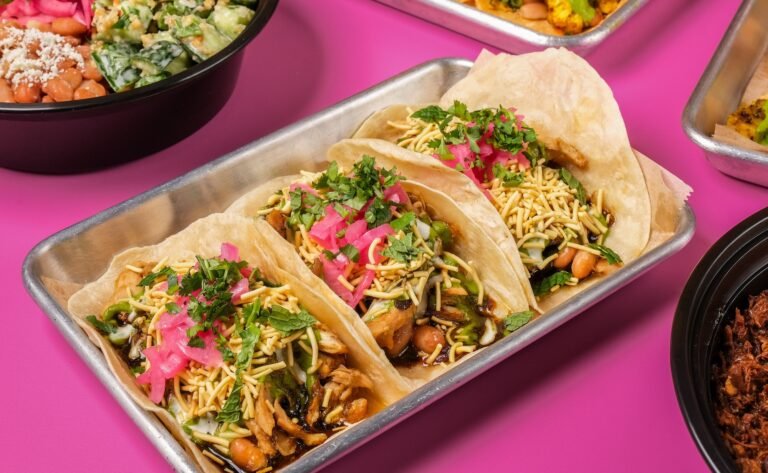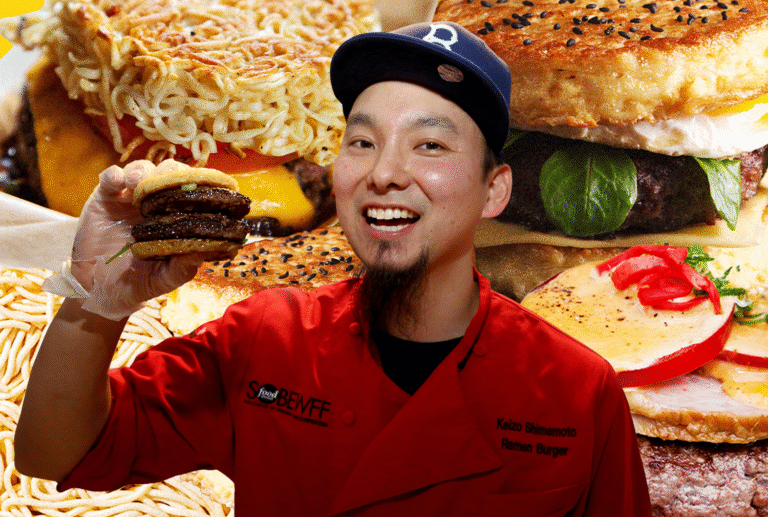

I think as a kid when your family is fucked up, you fantasize about things. You tell stories, you build forts, you do anything to transport yourself from the corner of the home you’re hiding in while your parents tear each other apart. At least that’s how I dealt with it.
One of the few positives in my family was that my mom could really cook, specifically homestyle Chinese Taiwanese food and the things she ate on the street as a kid. Her father and uncle used to sell mantou under a bridge when they first escaped to Taipei, but my mother took it to another level at home, cooking things like oh-ah-mi-shwa (pig intestine oyster vermicelli), zhong zi (sticky rice in bamboo leaves), minced pork stew, lion’s head meatballs, and red cooked pork. Even if she said nasty things to my face, I would reason that she had to love me to some degree if she put this much effort into the food she cooked for me.
It’s well-documented that I grew up in an Orlando restaurant run by my father called Cattleman’s Steakhouse. It was a fine steakhouse with USDA Prime meat, offering coupons for $10.99 prime rib and a phenomenal salad bar. Objectively, it was a step above Texas Roadhouse or Outback, but slightly below Morton’s or Ruth’s Chris due to the cowboy-themed dining room designed by a street dude from Taipei.
I started off as a busboy at 15, then prep cook, then grill, then saute, but by the age of 17 I became the expediter. Watching the tickets come through, firing off the orders to the kitchen, slamming baked potatoes and rice pilaf onto plates shouting “All day!” or “86!” was the best part of my day until I took my break to go buy Xanax from one of the older servers by the dumpster out back.
Expediting was the time of my life, but I didn’t want to get stuck in a restaurant because it was a hard life. A lot of people were drug addicts. Others were single parents. One of the managers was always disappearing, then reappearing, then one year just died.
My dad fired me for fucking around at work. Then a few months later I caught an assault charge and my parents couldn’t understand why I kept throwing my life away. I couldn’t explicate it either until I saw Good Will Hunting. It was the first time I saw the feelings I had projected in any sort of way besides irrational violence.
That’s when I decided I wanted to be a writer-director one day.
I got my start renting the Rollins College Library camcorder, shot a short film in the parking lot of Lee’s Liquor, and my professor, Dr. Boles, submitted it to Columbia’s Summer Film Program on my behalf. I got accepted, went, wrote more scripts with Asian characters, but all-Asian cast films or TV shows were a joke. A professor at Columbia told me to my face that “Hollywood will never make a show with all-Asian faces.”

I took it as a personal challenge, but had no idea how I was going to pull it off.
Walking out of Columbia the last day of our summer film program, I saw a guy with a blanket selling Sickamore, Black Wall Street, and Green Lantern mixtapes. I copped three for $10 and saw a Burkina sticker on one of them. I looked up Burkina online and discovered it was a mixtape spot near First and First with Army Navy gear hanging from the ceiling, making it feel like a bomb shelter. I went looking for more tapes, but what I discovered were a bunch of bootleg T-shirts with things like “Stop Snitching” on them.
I started wandering the neighborhood and found Nort, Recon, and a bunch of other stores selling what may or may not have even been referred to as streetwear yet, but I started pressing up shirts myself and selling them on the train.
That was my portal into downtown NY and I met Asian people that were more similar to the uncles in my dad’s Taipei youth gang than the kids at Chinese school in Orlando.
I started to sell all kinds of things and it was a lot of fun. I forgot about film and writing for the moment.
Then in the mid-2000s David Chang came onto the scene in the East Village selling noodles and gua bao. There was tremendous interest in Asian fusion food all of a sudden, but it really pissed me off that people thought Dave — now my good friend — invented the bao.
Since the 1950s, people had been selling gua bao, which employed the sugar dough from mantou, filling it with braised pork belly and pickled mustard greens.
As Chang writes in the Momofuku cookbook, he ate “Peking” duck baos at Oriental Garden, a phenomenal but now-shuttered Cantonese restaurant in New York where you wouldn’t get actual Peking duck. The restaurant served the “Peking” duck with gua bao, which is also a telltale sign you are not eating Peking duck because it would normally come with a pancake or crepe-like carbohydrate. That said, Dave is served this bastardized “Peking” duck and comes up with the idea to roast pork belly and serve it on a gua bao with hoisin and a pickle using French technique.
That is absolutely Dave’s innovation. But because the American audience had not seen the original, they believed they were seeing something for the first time. Even though it already existed.
The first time I had gua bao was in 1994. I remember it because I went to the last LA Rams game at Anaheim Stadium where they lost to my Washington Commanders. The next day, I went to a bakery with my grandma and she bought me a gua bao. It was glorious and actually gave me the confidence to tell people I was Taiwanese.
“Because the American audience had not seen the original, they believed they were seeing something for the first time.”
Being Taiwanese Chinese at the time, most people just said they were Chinese because of the politics. Even if someone was brave enough to say Taiwanese, people just thought you meant Thailand and it wasn’t worth it. I could stomach that, but the gua bao thing bothered me.
Living in mid-2000s downtown New York, hipsters at places like Welcome to the Johnsons or No Malice Palace would argue with me saying Dave invented them and I absolutely got into some really stupid drunk-high fights over this.
I was selling weed and other things off South Oxford Street at this time. One weekend my mom came to visit and a few guys came to the apartment to re-up around 11 p.m. and she figured out pretty quickly what was going on. She cried, couldn’t believe what I was doing, and I was like, “All right, all right, relax.” A few weeks later I took my money and got a lease on Rivington Street to sell gua bao the Taiwanese way.
I wasn’t plugged into the Manhattan food scene. I ate around my crib in Brooklyn, Chinatown, or took the 7 to Flushing. I didn’t even know what No. 7 restaurant was at the time even though my South Oxford-Fulton C train was right on top of it. I didn’t think I was welcome in certain spaces because of what I did and how I dressed so I just stayed away. (I ended up being good friends with chef Tyler Kord, who taught me to eat broccoli and helped me stop being so defensive towards hipsters and their restaurants.)
The idea for Baohaus was simple: Set up shop across from Alife and a basketball court on Rivington where the customer was a person I understood and sell them gua bao at a good price. I didn’t think to change who I was, what I wore, or what I listened to. I was oddly also into Bauhaus and brutalist architecture, but “bao” flowed better than “Brutalisthouse” so there it was.
I got the lease, then asked my homie who was good with Formica to build a simple counter in the middle and install Ikea shelves. Put some family photos on the wall and boom — we were open.

The menu had five to seven items depending on how much energy I had that particular day. The constants were a Chairman Bao, which was red cooked pork belly topped with pickled mustard green, peanuts, red sugar, and cilantro; the Birdhaus Bao, which was five-spice-brined chicken thighs, fried and topped with aioli, peanuts, red sugar, and cilantro; the Uncle Jesse, a fried tofu bao with a different aioli but the same toppings; a Haus Bao that had red cooked skirt steak until skirt steak became too expensive; fried baos with condensed milk; and if we had energy, boiled vinegar peanuts and a Taiwanese beef noodle soup.
A couple months in, a white guy who spoke some good ass Mandarin came in with a pregnant woman for lunch. I made them some baos, some beef noodle soup, and the white guy actually put me onto the greatest Taiwanese film I’ve ever seen: A Brighter Summer Day. I hung out with them for a solid hour as I did most people who came by in the early days. A few weeks later, I get a call from the New York Times, which revealed the pregnant woman was Ligaya Mishan, who wrote an under-$25 column at the time. The white guy was the inimitable Ahrin Mishan, who has immaculate taste in food and new wave cinema.
The day after her review dropped, there was a line down the block and I never looked back. This was my chance.
To me, Baohaus and the gua bao was a vehicle to tell a story about where my family was from, but you could only say so much through a restaurant. Or at least I thought that.
Agents started coming to the restaurant asking me to write cookbooks and such. I told all of them that I wanted to write a memoir about growing up Taiwanese Chinese in America and they laughed at me… even the agent that eventually repped the book.
I held my ground, refused to be called a chef, and refused to write the cookbook because I knew that if I got pigeonholed as a chef, I would never get to be a writer-director. A lot of people around me, including my family, thought I was stupid and that my dreams were unrealistic.
Ultimately, one agent agreed to read the first and last chapter of this “memoir,” but if it was no good, I owed him a cookbook and I agreed. I locked myself in my apartment from Friday to Sunday and sent it to him that night. A couple weeks later, he sent it out to five publishers and by the end of the month we had meetings with all of them. The editor we chose was none other than Chris Jackson, who I still work with. That book became Fresh Off the Boat.
We got Asians on television. Constance Wu did her thing. Ali Wong got her first job in our writer’s room. Awkwafina’s first appearance was on the original Vice version of Fresh Off the Boat. Luna Blaise just opened Jurassic Park and everyone has gone on to do amazing things.
Eleven years later, I closed Baohaus in the pandemic. The guys wanted to work, but people kept getting sick and I wanted them to collect unemployment before it went dry. I shut down early with dreams of reopening, but eventually relented and gave the lease back to the landlord in October 2020 with no end in sight.
I don’t regret it. People know where Taiwan is, and it is now confirmed that while Dave Chang is a spectacular chef, he did not invent the gua bao. In his defense, he never claimed to. It was one of those things people said for him.

While I was writing and directing, a lot has changed in the Asian American culinary scene.
Anajak Thai has kind of reimagined Roy Choi’s Asian Mexican observation of LA and put it on a tostada pedestal with dry-aged fish and other oceanic offerings. Pairing it with wine in a back alley of Sherman Oaks has cemented it as the restaurant to be at in LA.
Danny Bowien can’t stop won’t stop and his energy on a wok is pretty much unmatched even if he makes fried rice with fresh rice.
There’s Calvin Eng in Brooklyn doing truly American Cantonese food at Bonnie’s and since the Cantonese have been here longer than anyone else you get a real reflection of capital-A America in his cooking.
Cory Ng, the proprietor of Phoenix Palace and Potluck Club, has been holding down Chinatown since he was throwing up Twon and bagging up sausages at Kam Man two decades ago. Cory not only puts out excellent food, but he does a lot of community work for seniors, which I gotta shout out.
Shoutout Ha’s even though I have to dine there at either 5 p.m. or 10 p.m., but I love to see another brother with the jade Buddha and vintage Rolex Date just getting it. The level of difficulty cooking the precise food they’re putting out of that kitchen with a combi-oven and one electric burner is Simone Biles-level shit most people wouldn’t even attempt.
There are also Asian Americans in the Mountain West doing it big like chefs Anna and Ni Nguyen at Sắp Sửa resurrecting his mother’s Vietnamese food in a modern setting.
Shoutout Naks, shoutout Kalye, PhiLiPPiNES iS PROUD OF UUUU!
Where my Koreans at? Atomix, Atoboy, but don’t forget Woorijip you feel meeeeeeee.
Shoutout David Chang and Roy Choi, who paved the way for a lot of chefs.
Writing, film, television are all excellent mediums, but they’re group projects in a different way than a kitchen. There are 100 people with notes standing between the script and the screen that film will ultimately be projected on. Every once in a while, someone wins a 1v100 battle and gets a great film across, but if there’s one thing I learned the past decade it’s that perhaps the immigrant story was actually best told in a kitchen where the line is immediate, direct, and physically digestible.
We’ve come a long way and I’m excited to be back in the kitchen these days.


